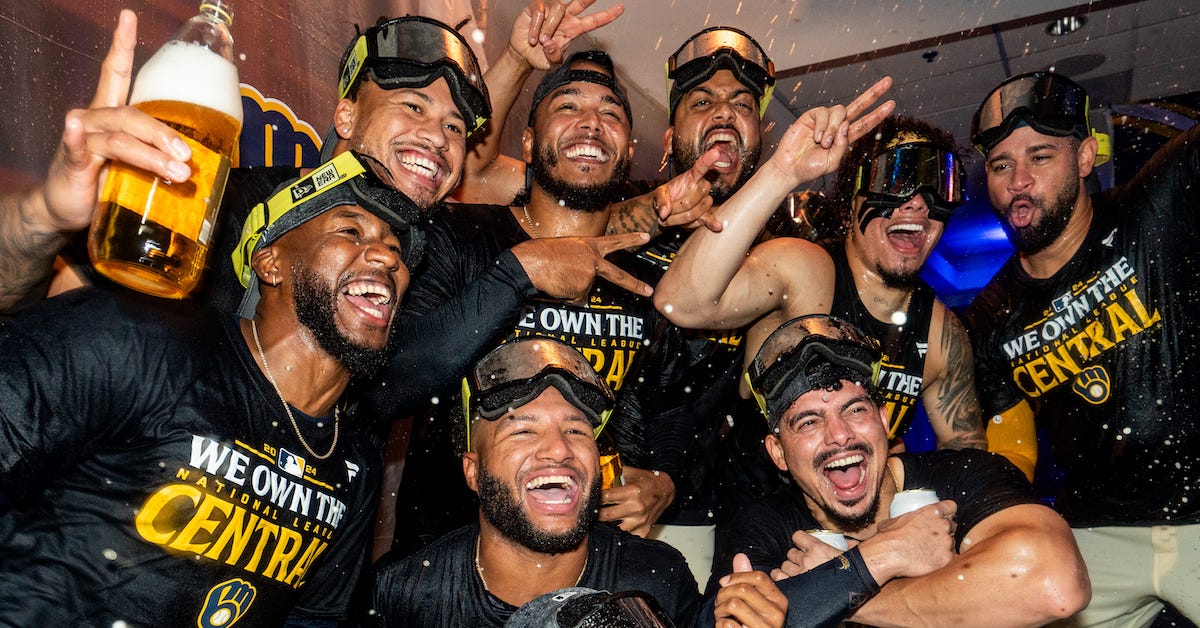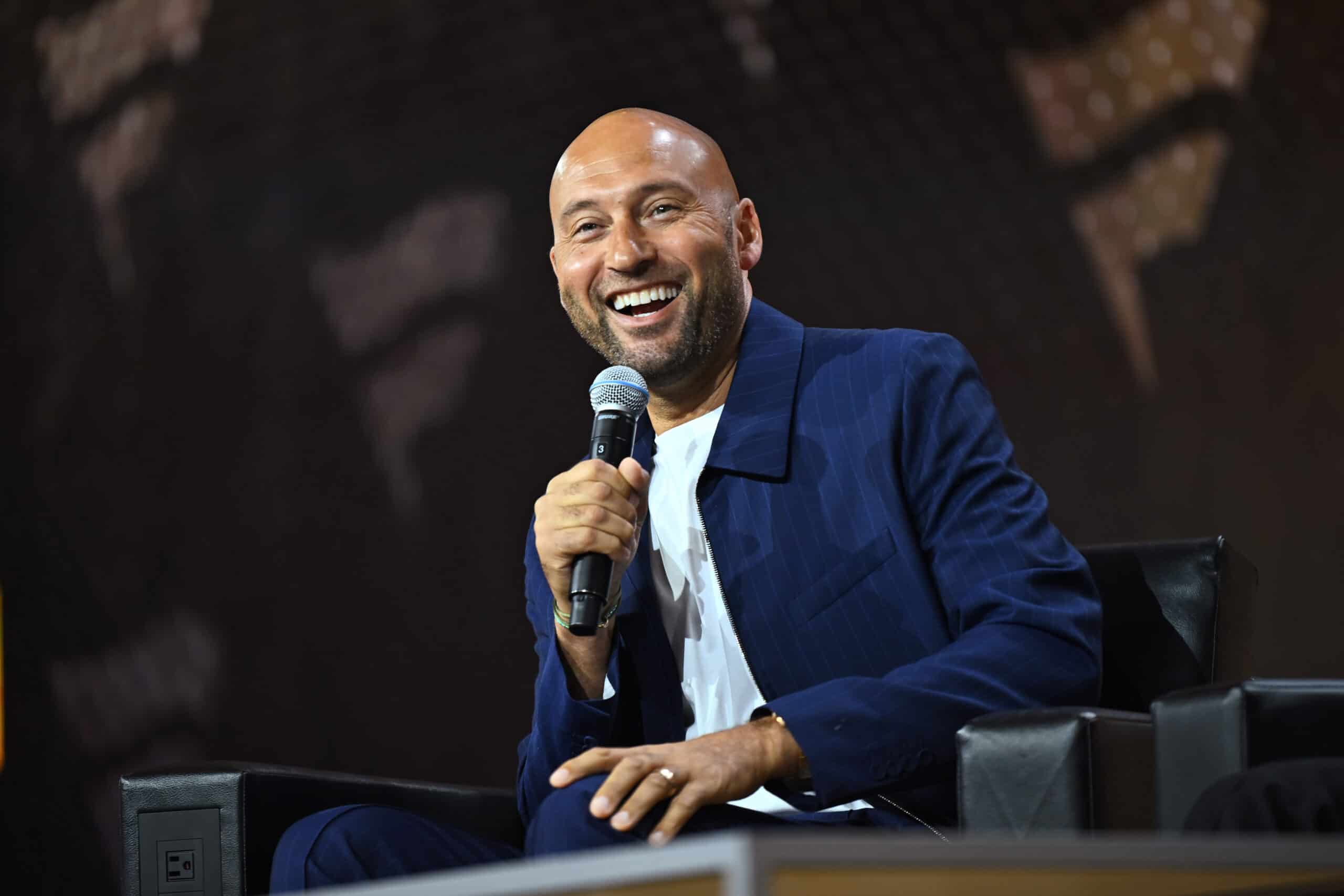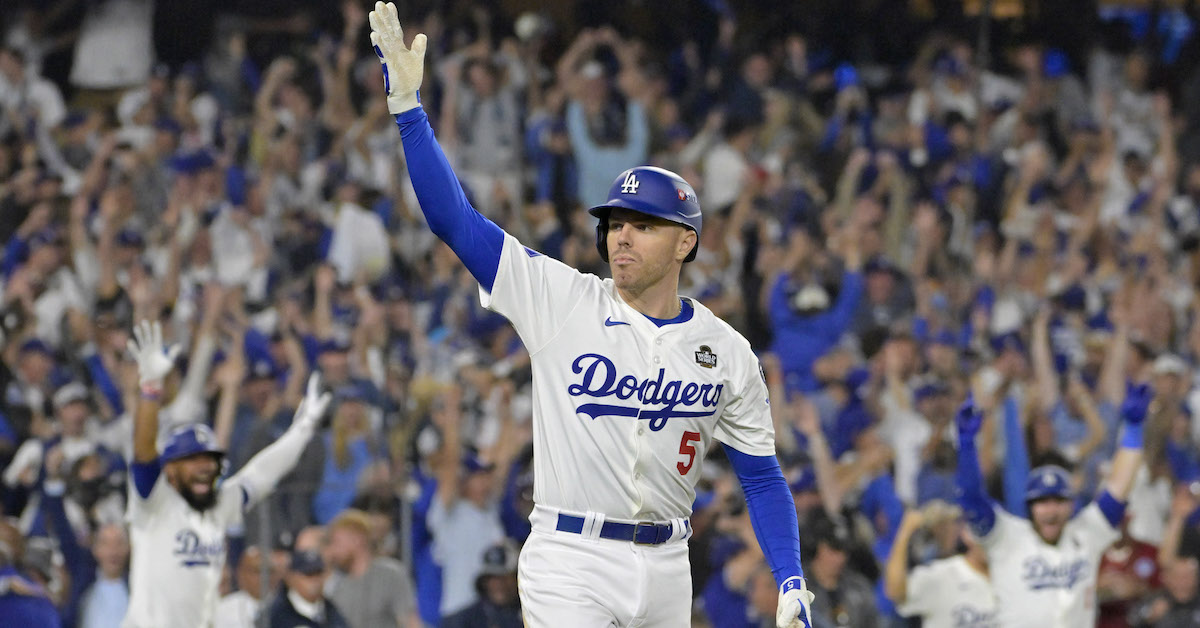[ad_1]
The Brewers clinched a playoff spot on Wednesday afternoon, with the Cubs’ loss to Oakland early in the afternoon. The Brew Crew themselves waited until after their game against Philadelphia later in the evening to celebrate properly — turns out that a pregame champagne bacchanal is frowned upon in this day and age — but by golly, they sure did seem to enjoy themselves. The team set out a stroller full of non-alcoholic offerings for underage outfielder Jackson Chourio, confetti was tossed around, music played, and so forth. Bob Uecker was thrilled to the point of incontinence.
It will surprise no one to learn that when it comes to clinching parties, I am strictly opposed to acting like you’ve been there before. Some fuddy-duddies, angered by the realization that anhedonia is not a universal condition, will say there’s still work to be done for the Brewers, a team that’s now made the playoffs six times in seven years but has connived to win only a single postseason series in that span. That’s surely true, and should Milwaukee repeat its traditional low-scoring first-round flameout, I’ll be right there in line to level appropriate criticism. But let’s not overlook the fact that winning the division requires months of hard work by hundreds of people throughout the organization. It would be disrespectful to those who put in that effort not to take a moment, for one night, to celebrate the product of all that labor.
I do feel obliged to say that, having witnessed a handful of similar celebrations in person, the smell of victory is anything but sweet. The combination of sweat, cheap beer, champagne, cigar smoke, and fog machine jetsam comes together to form the kind of aroma for which the phrase “I know it smell crazy in there” was first coined. Last fall, I was leaving the press conference room in the basement of Citizens Bank Park after Game 2 of the NL Wild Card Series, and was a few feet away when Marlins manager Skip Schumaker congratulated his counterpart, Rob Thomson, on his team’s victory. It was a moment I feel privileged to have witnessed, and my overpowering memory is that Thomson — who was positively sopping wet — smelled like no human being I’d ever encountered before. Winning makes you nose-deaf, I guess. Good on the Brewers, is the point, and while this particular celebration has been coming for weeks, I was taken aback when I realized that it was the first of the season, anywhere in the league, and it came on September 18.
That’s pretty late for the first clinching of the season. Especially because this isn’t one of those years where the schedule stretches into October — the last day of regular season action is September 29. September 18 is the latest date for the first playoff clinch since 2015. The Brewers made it official after their 151st game, or 93.2% of the way through the season. That’s the furthest the first clincher has gone into the season since the Dodgers in 2013. Clearly, that’s a symptom of a changing competitive curve for the league. This is also likely to be the first major league season since 2014 without a 100-win team. That’s a pretty wild adjustment after years of watching the Dodgers or Astros or Braves clear triple-digit wins with room to spare.
In the first two seasons of the 12-team playoff era, the first clincher — the Dodgers in 2022, the Braves in 2023 — punched its postseason ticket with at least 20 games left on the calendar. Generally, a late first clinch ought to mean a fun pennant race, right? Like, if every playoff spot is still up in the air midway through September, there should be lots of drama in the last week or two. The latest first clinch of the Wild Card era was in 2007, when the Red Sox locked up the first playoff spot on September 22, after 155 games. And that was an absolute dynamite playoff race, especially in the National League. That was the year of the Mets’ first September collapse, and the Rockies won 13 of their last 14 regular season games to force a Game 163 against the Padres, which they won, and you know the rest. All told, just two games separated the top seed in the NL, the Diamondbacks, from the Mets, who finished two spots out of the postseason.
Well, that doesn’t seem to be the case this season. The Brewers were first to officially claim a spot in the playoff bracket, but in the ensuing 30 hours, three other teams followed suit. In five of the six divisions — everywhere but the NL Central — the first-place team has a lead of between four and six and a half games. As of this writing, Milwaukee is the only team to clinch its division, but I’d be mildly surprised if any one of the six division titles were still undecided by the start of the final series of the regular season. The Wild Card races are a little livelier, but the Orioles and Padres are basically safe even now. We’re one Tigers winning streak from being in for a real snoozer of a final weekend.
I’ll end with one final point, accompanied by the least scientifically rigorous graph you’re likely to find on this website. A late first clinch doesn’t necessarily mean a good pennant race, but it is a sign that the entire playoff field is fairly compressed. When one team clinches abnormally early, it usually means there’s one dominant team: Cleveland in 1995, the Mariners in 2001 — the Yankees actually wrapped up a playoff berth in August in 1998, and that’s generally viewed as one of the most dominant seasons in baseball history. Of course, the dominant team frequently falls on its face in the playoffs. Of the 15 earliest first clinchers of the Wild Card era, four won the World Series. That’s more than twice as many as you’d expect if the playoffs were totally random, but not enough to call an early clinch a harbinger of dominance. Nine of the remaining 11 failed to even win a round.
So does a late first clinch portend a good postseason in general? I could have tried to rank these postseasons subjectively, but that’s an imprecise task complicated by the fact that I have no memory of some of these postseasons, as the late games conflicted with my bedtime. Instead, I took a “more is better” approach, and calculated the number of postseason games played as a percentage of possible postseason games under that format. It’s not a perfect proxy for entertainment value. I’d put certain five-game series — the 2015 World Series and 2018 ALCS — up against most seven-gamers for drama and quality of play. But a postseason with lots of sweeps is an easy postseason for the neutral to forget.
The 1998 season, in which the Yankees dominated the regular season and cruised to a World Series victory so easily it was almost soporific, is the first trough in the graph. A few years later, you can see the two lines intersect in 2003. I’d call that postseason the best of my lifetime, with Aaron Boone’s pennant-clinching walk-off home run in the 11th inning of Game 7 and the Bartman Incident deciding the two LCS rounds. (I hear great things about 1986, but I was not born yet.) The 2003 postseason required 38 out of a total of 41 games to be played, tied for the most of the Wild Card era with 2011 — another great October that featured zero sweeps and an all-time classic World Series. But mostly, these two numbers have nothing to do with each other. The average season in the Wild Card era sees its first clinch 90.2% of the way through the schedule, and uses 80.2% of its playoff games. Six seasons have used less than 75% of the available playoff games; one was 1998, the…
[ad_2]



